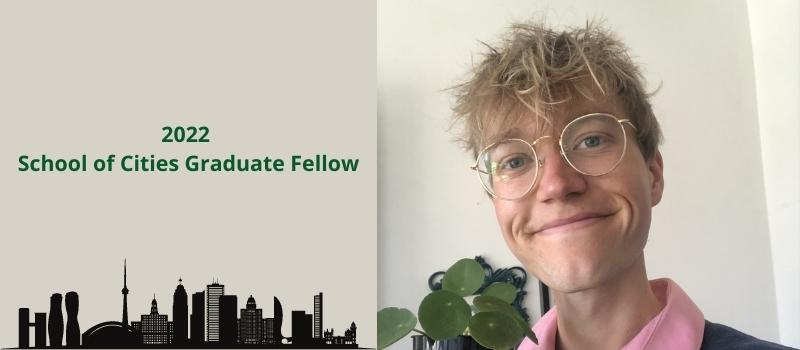
Congratulations to Felix Lambrecht for being awarded a 2022 School of Cities (SoC) Graduate Fellowship. This SoC program brings together an interdisciplinary group of University of Toronto doctoral students who share a passion for city-building and solutions to critical urban challenges. Throughout the fellowship, students will collaborate with scholars at the School of Cities on research relating to policy, as well as on applied projects about the role of cities in our lives. Involving a public dimension, the collaborations will provide fellows with an opportunity to engage directly with (and learn from) the city on which their work draws.
Lambrecht’s project, “Reparative Justice in the City,” considers the particular ways in which cities and the agents within them (individuals, governments, community advocacy groups, and the like) might work toward the kind of moral relationships that reparative justice requires. Drawing on interdisciplinary dialogue with other fellows and scholars within the program, Lambrecht hopes to reveal the kinds of tools cities can use to structure reparative justice. “Specifying these tools,” he says, “creates a more robust and cohesive account of reparative justice,” thus making it “invaluable” to his general philosophical research project, which investigates historical injustices.
He explains: “Previous philosophical models argue that reparative justice requires the return or compensation of some injury that occurred in the past. My project argues that reparative justice requires achieving relationships of equality between all individuals, groups, and communities within society.” Because cities constitute an essential site for enacting moral relationships, they can play a profound role in repairing historical injustices. “Many of our most meaningful relationships occur in cities,” Lambrecht asserts: “Habitual interactions fundamentally structure our lives; sense-of-belonging fosters mental health; access to city resources determines our ability to participate inclusively and equitably in society. Restoring and ensuring that these meaningful city-relations are moral, respectful, and equal, is, therefore, a fundamental component of repairing historical injustices.”
The philosopher enthusiastically looks toward collaborating with colleagues who develop and implement urban spaces and policies to ensure these are designed to foster equitable relationships and justice. As examples, he says, we might think of infrastructure networks aimed at increasing equitable access for historically marginalized communities, public artwork that platforms voices from oppressed groups, or the democratization of municipal governance by providing access to community advocacy networks in decision-making procedures.
We cannot wait to see the fruits of these collaborative labours!
SHARE